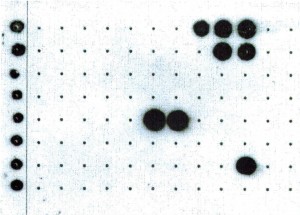Nucleic acid hybridization (NAK) also known as dot-blot hybridization has been used since the 1980s with increased specificity compared to ELISA. Agdia has enhanced the assay by developing a new buffer, AG1 Lysis Buffer, which simplifies the extraction process compared to traditional nucleic acid extraction techniques. These tests utilize multiple nucleic acid probes, which are labeled to target complimentary single-stranded nucleic acid on a nylon membrane.
Getting results is as easy as preparing the samples and spotting them onto the supplied membrane, where the targeted nucleic acids become immobilized. Once the step has been completed, the end-user mails the membrane to Agdia Testing Services for processing. Agdia’s laboratory will then introduce the membrane to labeled probes where it will hybridize to complementary nucleic acid structures, if present. Finally, chemiluminescent detection is used to produce a visual spot by exposing the membrane to film, indicating a positive result.
Begomovirus Group (NAK 15001) are members of the Geminiviridae family and can infect a wide variety of plants. The viruses are transmitted via insect vectors, whiteflies, and have been known to cause significant crop loss. The nucleic acid hybridization assay for the Begomovirus group was validated to detect the following viruses: Tomato yellow leaf curl virus (TYLCV), Bean dwarf mosaic virus (BDMV), Bean golden mosaic virus (BGMV), Bean golden yellow mosaic virus (BGYMV), Chino del tomate virus (CdTV), Pepper golden mosaic virus (PepGMV), Squash leaf curl virus (SLCV), Tomato golden mosaic virus (TGMV), Tomato mottle virus (ToMoV), and Tomato severe leaf curl virus (ToSLCV).
Curtovirus/Becurtovirus Group (NAK 13100)
Curtovirus/Becurtoviruses are members of the Geminiviridae family and infect a broad range of hosts, including weeds and crops (pepper, tomato, beans, spinach, and cucurbits). Symptoms observed include severe stunting, yellowing, and, if infected early, plants will not produce fruits. Transmitted by leafhoppers and overwintering in weeds, these viruses are becoming a major economic pest. The nucleic acid hybridization assay for the Curtovirus/Becurtovirus group was validated to detect the following viruses: Beet curly top virus (BCTV-A, B, C, E, F, and H), Spinach severe curly top virus (SpSCTAV), and Spinach curly top Arizona virus (SCTAV).
The hybridization assays are offered with AG1 Lysis Buffer and membranes. Processing of the membrane by Agdia Testing Services is included in the cost of the kit. Agdia provides a 1 year warranty and continual customer support.
For more information: info@agdia-emea.com, phone +33 1 60 78 81 64.


